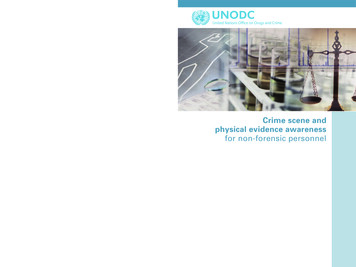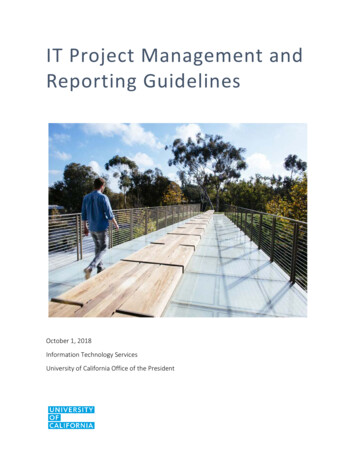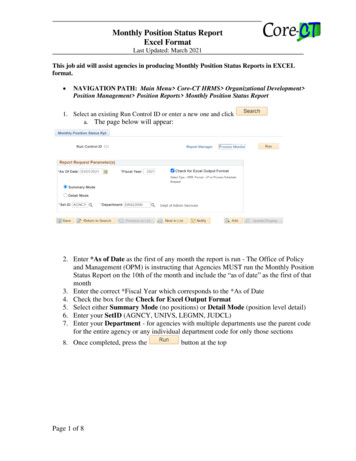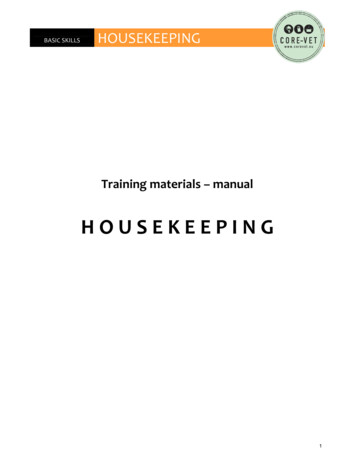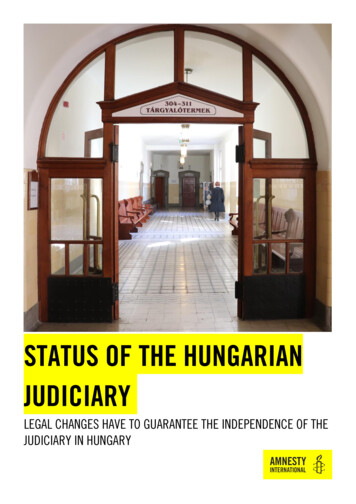
Transcription
STATUS OF THE HUNGARIANJUDICIARYLEGAL CHANGES HAVE TO GUARANTEE THE INDEPENDENCE OF THEJUDICIARY IN HUNGARY
Amnesty International is a global movement of morethan 7 million people who campaign for a worldwhere human rights are enjoyed by all.Our vision is for every person to enjoy all the rightsenshrined in the Universal Declaration of Human Rightsand other international human rights standards.We are independent of any government, politicalideology, economic interest or religion and are fundedmainly by our membership and public donations. Amnesty International Hungary 2021Except where otherwise noted, content in this document is licensed under a Creative Commons(attribution, non-commercial, no derivatives, international 4.0) -nd/4.0/legalcodeFor more information please visit the permissions page on our website: www.amnesty.orgWhere material is attributed to a copyright owner other than Amnesty International Hungary thismaterial is not subject to the Creative Commons licence.First published in 2021by Amnesty International Hungary1054 Budapest,Báthory u. 4., HungaryIndex: EUR 27/3623/2021Original language: Hungarianamnesty.huCover photo: Gabor Hacsi/Amnesty International Hungary
CONTENTSCONTENTS3GLOSSARY41. EXECUTIVE SUMMARY52. METHODOLOGY7QUESTIONS ASKED IN THE ONLINE QUESTIONNAIRE83. INTRODUCTION94. APPOINTMENT OF COURT LEADERS115. PERCEIVED IMPARTIALITY OF THE COURTS146. SITUATION OF THE NATIONAL JUDICIARY COUNCIL177. ATTACKS IN MEDIA UNDERMINE THE INDEPENDENCE OF THE JUDICIARY20MEDIA AND POLITICAL ATTACKS ON THE JUDICIARY CONTINUE IN 202020NJO PRESIDENT’S OR OTHER COURT LEADERS’ GENERAL LACK OF REACTING TO THESEATTACKS218. CHILLING EFFECT AND JUDGES’ RIGHT TO FREEDOM OF EXPRESSION239. THE FINAL NAIL IN THE COFFIN: HOW THE ELECTION OF A NEW KÚRIA PRESIDENT AND APPOINTMENT OFJUDGES TO THE KÚRIA AFFECT THE PERCEPTION OF JUDICIAL INDEPENDENCE2510. CONCLUSIONS AND RECOMMENDATIONS28CONCLUSIONS28RECOMMENDATIONS TO THE GOVERNMENT OF HUNGARY28RECOMMENDATIONS TO THE NJO PRESIDENT29STATUS OF THE HUNGARIAN JUDICIARYLEGAL CHANGES HAVE TO GUARANTEE THE INDEPENDENCE OF THE JUDICIARY IN HUNGARYAmnesty International Hungary3
GLOSSARYWORDDESCRIPTIONAOACAct CLXI of 2011 on the Organisation and Administration of CourtsCHAMBEREither a single judge or a group of judges adjudicates in the name of the court,depending on procedural rules. In case of a group of judges it is called achamber.COLLEGESpecial groups of judges based on their field (e.g. civil law, criminal law,administrative law) at regional courts, regional courts of appeal and at the Kúriathat professionally monitor the adjudicating practise of courtsDISTRICT COURTLowest level of ordinary courtsHCCHungarian Constitutional Court. Its members in this report are called “HCCjustices.”JUDGES’ PLENARYMEETINGThe general assembly for judges working at the Kúria, at a regional court ofappeal or in a county either at the regional court or at the district courts in thecounty. The judges’ plenary meeting is convened a few times per year andcomprises of all judges, where they may discuss various topics, give opinions (forexample, about leadership candidates), and elect the local judiciary councils andthe electors for the NJC electoral meeting.KÚRIAThe Supreme Court of Hungary, the highest-level ordinary courtNJCThe National Judicial Council (in Hungarian: Országos Bírói Tanács) supervisesthe operations of the NJO and in some cases its approval is needed for an NJOdecision.NJC ELECTORALMEETINGJudges’ plenary meetings elect representatives (electors) from themselves whoelect the members of the NJC on the NJC electoral meeting.NJONational Judiciary Office (in Hungarian: Országos Bírósági Hivatal) is the centraladministrative organ for courts that is led by the NJO President. When mentioningthe “NJO President” in this report, Amnesty International refers to Mr. GyörgyBarna Senyei, the current NJO President, unless otherwise specified.REGIONAL COURTOrdinary courts one level higher than the district courts. There are 20 regionalcourts.REGIONAL COURTOF APPEALOrdinary courts one level higher than the regional courts. There are 5 regionalcourts of appeal.STATUS OF THE HUNGARIAN JUDICIARYLEGAL CHANGES HAVE TO GUARANTEE THE INDEPENDENCE OF THE JUDICIARY IN HUNGARYAmnesty International Hungary4
1. EXECUTIVE SUMMARYThe right to a fair trial is protected by Article 6 of the European Convention on Human Rights and it is alsoinstrumental to the judicial protection of all other rights enshrined in the European Convention. It requiresthat cases are heard by an independent and impartial tribunal established by law. The guarantees of an“independent” and “impartial” tribunal are closely interrelated. If a tribunal is not independent of theexecutive power, it is likely to be breaching the requirement of impartiality also in cases to which theexecutive is a party. The European Court of Human Rights commonly considers the two requirementstogether.1 Therefore upholding the independence and the impartiality of the judiciary is crucial forguaranteeing the right to a fair trial and other human rights. Without independent judges, it is questionablewhether one’s legal dispute can be settled in a fair way and whether individuals can enjoy the judicialprotection of their human rights.The Government of Hungary has initiated and implemented several steps that have adversely impacted theindependence and impartiality of judicial institutions in Hungary. Between 2010 and 2020 several stepswere taken that combined to amount to a systemic attack against the independence of these institutions.These developments are underlined by the first European Commission Rule of Law report of 2020, thatfound that over the past years, EU institutions have identified several developments of concern in relation tojudicial independence in Hungary, but most of their related recommendations have not been addressed.The present Briefing provides an insight on the current state of the judiciary and its level of independence atthe beginning of 2021. Amnesty International’s research included desk research and a non-representativeonline questionnaire filled out by 18 Hungarian judges in June and July 2020.2This report’s main findings are the following: The National Judiciary Office (NJO) President’s unbalanced powers in court administrationcontinues to undermine the independence of the judiciary. Although the European Commission,3the Council of Europe’s Venice Commission4 and Council of Europe’s Commissioner for HumanRights 5 repeatedly called upon the Hungarian Government to counter-balance the powers of theNJO President’s to appoint court leaders and other competences, this has not happened yet. The previous NJO President had been criticized heavily for abusing her power to appoint courtpresidents and other court leaders. From 10 December 2019, the NJO has a new President,György Barna Senyei. Based on Amnesty International’s research, the NJO President hasconducted court leader appointments legally in 2020. Nevertheless, Amnesty International is of theopinion that the relevant regulations do not provide appropriate systemic guarantees against abuseof power by the NJO President. The National Judiciary Council (NJC) is the judges’ self-governing body, consisting of judges, whoare elected by the judiciary. It is the main institution to balance the management powers of theNJO. The competences of the NJC remain weak and should be strengthened as wasrecommended by the Venice Commission and the Council of the European Union6. Consequently,without any amendment to the laws, the NJC cannot fulfill its constitutional role.See cases Cooper v. United Kingdom, no. 48843/99, ECHR 2003-XII and Volkov v. Ukraine, no. 21722/11, ECHR 2013See the methodology at Section 2 of this report.3European Commission Recommendation for a Council Recommendation, COM(2019) 517 final, Para. 17 and Recommendation 019/EN/COM-2019-517-F1-EN-MAIN-PART-1.PDF4Para. 32 ult.aspx?pdffile CDL-AD(2012)020-e5Para. 128 6Para 17. ge-en12STATUS OF THE HUNGARIAN JUDICIARYLEGAL CHANGES HAVE TO GUARANTEE THE INDEPENDENCE OF THE JUDICIARY IN HUNGARYAmnesty International Hungary5
During 2018-2019 a constitutional crisis emerged as the previous NJO President questioned thelegitimacy of the NJC. In 2020 the communication between the actors and the overall situation hasimproved. The new NJO President accepted the legitimacy of the NJC and additional NJCmembers were elected in July 2020 to replace members of the NJC who had previously resigned.However, the relationship remains problematic: for example, court secretaries for NJC membersare still not guaranteed, the NJC office lacks an office secretary, therefore it is lacking resources toeffectively undertake its work. The NJC is still not given access to be portrayed on the officialwebsite of courts. The Parliament of Hungary has adopted legal changes in 2019 and 2020 that combined haveallowed to widen the pool for potential candidates as president of the Kúria and have strengthenedthe powers of the President of Hungary over the judiciary to nominate a candidate. In October2020 the Hungarian Parliament elected Zsolt András Varga as president of the Hungarian SupremeCourt (“Kúria”). In its opinion, the NJC did not support Mr. Varga, mainly because he did not haveany experience at ordinary Hungarian courts and because his election was made possible by thetwo recent pieces of legislation that had been claimed by the NJC to be ad hominem. Political and media attacks on the Hungarian judiciary continued in 2020, which negativelyaffected judicial independence. The NJO President and other court leaders have overwhelminglyremained silent during these attacks, and thus have contributed to the chilling effect of suchattacks on the judiciary: ordinary judges have been afraid of freely expressing their opinion andstating their positions in matters related to the judiciary because of fear of retaliation at theirworkplace or in public. The atmosphere at courts and the chilling effect continues to be problematic despite a few positivedevelopments. The NJO President has not supported judges to express their opinion on any issuespublicly. Related to the execution of an ECtHR judgement, the Council of Europe Committee ofMinisters stated that “in the light of the concerns expressed by the Court regarding the “chillingeffect” on the freedom of expression of judges caused by the violations in these cases”, and calledupon the Hungarian Government to present an action plan and take measures in this fieldincluding of the guarantees and safeguards protecting judges from undue interferences.STATUS OF THE HUNGARIAN JUDICIARYLEGAL CHANGES HAVE TO GUARANTEE THE INDEPENDENCE OF THE JUDICIARY IN HUNGARYAmnesty International Hungary6
2. METHODOLOGYThis Briefing paper is based on Amnesty International’s research.Amnesty International’s research analysed publicly available pieces of legislation, draft legislation,documents of the NJO (available at birosag.hu) and the NJC (available at orszagosbiroitanacs.hu) as well aspublicly available reports of the European Union and the Council of Europe.Amnesty International’s research also touched upon on how Hungarian judges themselves think aboutselected elements of organizational and individual judicial independence. To gather their opinions, AmnestyInternational invited judges to fill out an online questionnaire available from 29 June 2020 until 17 July2020. These were the following topics: appointment of court leaders, relationship between the NJO President and the NJC, the NJO President’s communication, personnel decisions and resolutions of the NJO President, atmosphere at the courts, the NJO President’s approach regarding the right to freedom of expression of judges.Questions asked in the online questionnaire are listed below.The questionnaire provides a qualitative and therefore not representative insight to the opinions of judges. Itwas filled in by: 18 judges, from all levels of courts: from district courts (5), from regional courts (9), from regional courts ofappeal (2), from the Kúria (2), from Budapest or Pest County (9), from Eastern Hungary (6) and from Western Hungary (3).Their period of tenure as a judge was as follows: two judges had worked as judges for 1-10 years, ten judgesfor 11-20 years and six judges for 21 or more years.The criteria for filling out the online questionnaire was to be an active judge at a Hungarian court for at leastone year. The anonymous nature of the online questionnaire did not allow Amnesty International to verify thefulfilment of such criteria.To reach the judges, Amnesty International used existing contacts and completed it with the snowballmethod. Hence the sample is limited to judges who have been open to share their thoughts with AmnestyInternational and intended to write about the abovementioned topics. Results from this questionnaire shallnot be interpreted to represent the opinion of the whole Hungarian judiciary.The judges gave their opinions and thoughts on the operation of the judiciary administration system underthe NJO presidency of Mr. Senyei who has been the NJO President from 10 December 2019.Judges could express their views in the questionnaire anonymously, thus they could speak their mind freely,without fear of any retribution, exercising their right to freedom of expression.STATUS OF THE HUNGARIAN JUDICIARYLEGAL CHANGES HAVE TO GUARANTEE THE INDEPENDENCE OF THE JUDICIARY IN HUNGARYAmnesty International Hungary7
On 30 June 2020, Amnesty International sent a letter to the NJO President asking to share his views on thetopics of the online questionnaire but has not received a reply from him.Moreover, the draft of this Briefing paper has been shared with the National Judiciary Office of Hungary, theNational Judicial Council, the Kúria and the Hungarian Ministry of Justice on 9 February 2021. AmnestyInternational has not received any comments from them as to the merits of this Briefing paper.All judges featured in this Briefing paper are referred to anonymously, all with their informed consent.Amnesty International would like to thank all the individuals who cooperated in the course of the research forthis Briefing paper, and special thanks to the judges filling out our online questionnaire.QUESTIONS ASKED IN THE ONLINE QUESTIONNAIRE1.What is your opinion about the practice of the NJO President (György Barna Senyei) regarding theappointment and assignment of court leaders? (For your information, for example, the NJOPresident directly appointed several persons on a temporary basis to perform managerial dutiespursuant to Article 133 (3) of the AOAC: Attila Hámori as the Szeged Regional Court of Appealpresident, Tamás Túri as the Pécs Regional Court of Appeal president, Judit Kissné Szabó as theSzolnok Regional Court, Babett Tárkány-Szűcs as the Szeged Regional Court.) Do you see achange in the appointing practice of the NJO President as compared to the previous period, and ifso, what is this change? If there was no change, what do you think is the reason?2.What is your opinion about the NJO President’s practise on judicial personnel matters (judicialappointments, secondments, transfers, appointments to the NJO, declaring applications invalid)?3.What is your opinion about the relationship of the NJO President with the NJC? Has thisrelationship improved or deteriorated, and what do you think indicates this?4.What is your opinion about the NJO President’s communication within the judicial organizationtowards the judges and the NJO President’s public communication in relation with the judges andthe judiciary?5.What is your opinion of the NJO President’s practice towards judges expressing their opinions sofar? For example, to what extent formally (at the level of regulations) or informally does he supportor not support judges to express their views on non-political issues (e.g. regarding courts or judicialindependence)?6.How do you think the courts’ atmosphere has changed (if any) since the election of the new NJOPresident? How do you assess the role of the NJO President in relation to this potential change?7.In the last six months, there have been several external attacks on judges and judgments (forexample, in connection with the judgment on school segregation in Gyöngyöspata or judgments onprison damages). What is your opinion about the NJO President’s attitude and activity in relation tothese and similar attacks?8.What is your opinion on the normative resolutions and recommendations of the NJO President sofar? How does the NJO President involve judges or judicial organizations (NJC, judiciary councils,Hungarian Association of Judges) in the decision-making process?9.What positive changes have taken place in the operation of the NJ0 since the appointment ofGyörgy Barna Senyei as president? What specific example (s) can you give?10. What negative changes have taken place in the operation of the NJ0 since the appointment ofGyörgy Barna Senyei as president? What specific example (s) can you give?11. Anything else you would like to say about the activities so far of NJO President György BarnaSenyei?STATUS OF THE HUNGARIAN JUDICIARYLEGAL CHANGES HAVE TO GUARANTEE THE INDEPENDENCE OF THE JUDICIARY IN HUNGARYAmnesty International Hungary8
3. INTRODUCTIONFrom 2012, under the Hungarian judicial reform, the administration of Hungarian courts became centralizedunder the President of the newly established National Judiciary Office (NJO). The NJO President is electedby the Hungarian Parliament and is considered a political appointee. The new laws granted extensive powersto the NJO President over the court administration (e.g. recruitment and promotion of judges, managementof the court system’s budget, etc.). The NJO President is the leader of judicial administration withoverwhelming powers, thus a key actor in providing the institutional guarantees of the right to a fair trial andother human rights. The previous NJO President had been criticized heavily for abusing her power to appointcourt presidents and other court leaders. From 10 December 2019, the NJO has a new President, GyörgyBarna Senyei.Although the European Commission7, the Council of Europe’s Venice Commission8 and Council of Europe’sCommissioner for Human Rights9 repeatedly called upon the Hungarian Government to counter-balance thepowers of the NJO President to appoint court leaders and other competences, this has not happened yet. Inits 2019 recommendation to Hungary within the European Semester Framework, the Council of theEuropean Union stated that “[c]hecks and balances, which are crucial to ensuring judicial independence,are seen to be under further pressure within the ordinary courts system. The [NJC] faces increasingdifficulties in counter-balancing the powers of the [NJO President]. Questions have been raised regardingthe consequences of this for judicial independence.”10 According to the Venice Commission11 “the powers ofthe President of the NJO still clearly prevail over those of the NJC, also because the current Council,composed exclusively of judges, cannot enjoy a true autonomy and independence from the NJO.” TheCouncil of Europe Commissioner for Human Rights, in her statement issued in November 2019, 12 reiterated“earlier recommendations on the need to strengthen collective judicial self-governance in Hungary, includingthe position and functions of the National Judicial Council.” The NJO President’s unbalanced powers incourt administration, however, have not been amended in 2020 and continue to undermine theindependence of the judiciary.The right of access to an independent and impartial tribunal is specifically guaranteed by Article 6.1 of theEuropean Convention on Human Rights (“Convention”). This right is also enshrined in Article 47 of theCharter of Fundamental Rights of the European Union (“right to an effective remedy and to a fair trial”). Indetermining whether a body can be considered to be “independent”, the European Court of Human Rights(ECtHR) considers the manner of appointment of its members and the duration of their term of office, theexistence of guarantees against outside pressures and the question of whether the body presents anappearance of independence.13 The ECtHR has delivered several judgments in which it concluded that therehad been violations of Article 6.1 of the Convention because of the dismissal of judges.14 Recently, theEuropean Commission Recommendation for a Council Recommendation, COM(2019) 517 final, Para. 17 and Recommendation 019/EN/COM-2019-517-F1-EN-MAIN-PART-1.PDF8Para. 32 ult.aspx?pdffile CDL-AD(2012)020-e9Para. 128 10Para 17. 170-2019-REV-2/en/pdf11Para. 32 https://www.venice.coe.int/webforms/documents/?pdf e-of-the-judiciary13Para. 2.2.11 Judges in Poland and in the Republic of Moldova must remain 8428feba12/doc.%2015204.pdf14Para. 2.2.12 Judges in Poland and in the Republic of Moldova must remain 8428feba12/doc.%2015204.pdf7STATUS OF THE HUNGARIAN JUDICIARYLEGAL CHANGES HAVE TO GUARANTEE THE INDEPENDENCE OF THE JUDICIARY IN HUNGARYAmnesty International Hungary9
ECtHR held that a breach of domestic law when appointing four judges to the new Court of Appeal of Icelandhad resulted in a violation of Article 6.1 of the Convention.15The new laws in 2012 also established the National Judicial Council (NJC) to provide checks and balancesover the NJO as the main institution to balance management powers of the NJO. The NJC is the main organfor judges’ self-governance, consisting of 14 judges elected by their judge peers and the president of theKúria. They represent Hungary’s judiciary, and the 3200 Hungarian judges. The NJC does not havedisciplinary power.During 2018-2019 a constitutional crisis emerged as the NJO President questioned the legitimacy of theNJC. In 2020, although the relationship between the NJO President and the NJC together with the overallsituation has improved, no legal changes have been made to strengthen the competences of the NJC.Consequently, the competences of the NJC remain weak and should be strengthened as was recommendedby the Council of the European Union16 and the Venice Commission.17 Without any amendment to the laws,the NJC cannot effectively, efficiently and satisfactorily fulfill its constitutional role.Application No. 26374/18, judgment of 12 March 2019 (not final)Para 17. ge-en17 Para. 32 https://www.venice.coe.int/webforms/documents/?pdf CDL-AD(2012)020-e1516STATUS OF THE HUNGARIAN JUDICIARYLEGAL CHANGES HAVE TO GUARANTEE THE INDEPENDENCE OF THE JUDICIARY IN HUNGARYAmnesty International Hungary10
4. APPOINTMENT OFCOURT LEADERSIn the present judiciary system, the NJO President has vast powers in court administration,18 thatsignificantly impact the right to a fair trial and its elements. Namely, the NJO President appoints andsupervises the regional court and regional court of appeal presidents, deputy presidents, college leaders.19Court leaders and among them especially court presidents have influence on the selection20 and career ofjudges and their evaluation.21 They also have significant powers in case allocation,22 allowing them to impacthow the right to a fair trial is upheld.As Amnesty International demonstrated in its Fearing the Unknown report in 2020,23 the previous NJOPresident (Tünde Handó) had had a practice of invalidating judges’ and court leaders’ applications in a nontransparent way and without giving clear justification for her decisions, misusing her power to appoint judgesand court leaders. For example, the previous NJO President disregarded judges’ plenary meeting opinionsbefore deciding on court leadership without a clear justification, in violation of the law.24 Also, in severalcases the previous NJO President regularly filled leadership positions not through regular applicationprocedures, but through temporarily, directly appointed interim leaders, thus abusing this legal possibility.25Another issue that the Fearing the Unknown report demonstrated is that in these temporary directappointments the leadership positions were filled in a manner contrary to the law, as was established by theNJC.26 The direct appointment of court leaders may affect guarantees of the right to a fair trial, for instancethrough case allocation and other means that impact the right to an independent and impartial tribunal. Asregards case allocation, court presidents are the ones who draft the case allocation policies at each courtoutlining the case allocation rules and appoint the persons who allocate the cases.27 Eventually the systemallows the case allocator wide discretion to decide to whom to allocate a case. It is a serious hindrance to theright of fair trial if a client’s case is allocated or re-allocated to a judge based on political or otherinappropriate motivation.28 International standards29 stress that “adequate structures within the judiciary andthe courts be established to prevent improper interference from within the judiciary”. According to theImplementation Measures of the UN’s Bangalore Principles of Judicial Conduct,30 “the division of workamong the judges of a court, including the distribution of cases, should ordinarily be performed under aArticle 76 of the AOACThe Venice Commission in its latest related report from October 2012 stated that “the powers of the President of the NJO remain veryextensive to be wielded by a single person and their effective supervision remains ocuments/default.aspx?pdffile CDL-AD(2012)020-e20Articles 11-13 of the Act CLXII of 2011 on the Legal Status and Remuneration of Judges (“ALSRJ”)21Article 70 of the ALSRJ22Article 9 of the AOAC23Fearing the Unknown, p. 19-20.24Article 132 (4) of the AOAC25According to Article 133 (2) of the AOAC, the NJO President may appoint interim court presidents for up to one year time if the regularapplication procedure is invalid because the NJO President does not accept any candidate for the presidency position.26Article 133 (1) of the AOAC. See para. 2.1.4 of NJC Resolution No. 34/2019. (V.08.) available at https://orszagosbiroitanacs.hu/2018-0502/27Article 9-10 of the AOAC28Fearing the Unknown, p. 24.25.29Para. 103 of the Report of the Special Rapporteur on the Independence of Judges and Lawyers, Leandro Despouy (A/HRC/11/41) (“2009IJL Special Rapporteur Report”) cs/11session/A.HRC.11.41 en.pdf30Para. 3. of the Measures for the Effective Implementation of the Bangalore Principles of Judicial tional standards/measures implementation/measures implementation.pdf1819STATUS OF THE HUNGARIAN JUDICIARYLEGAL CHANGES HAVE TO GUARANTEE THE INDEPENDENCE OF THE JUDICIARY IN HUNGARYAmnesty International Hungary11
predetermined arrangement provided by law or agreed by all the judges of the relevant court. Sucharrangements may be changed in clearly defined circumstances such as the need to have regard to ajudge’s special knowledge or experience.”Hence in the present research Amnesty International examined publicly available resolutions of the currentNJO President, the NJO President’s appointing court leaders, the NJO President’s statements andinterviewed judges to analyse his practice.Before his election, the NJO President told31 NJC members that as a general rule he would aim to respectthe judges’ plenary meetings’ opinions on court leaders’ applications.The NJO President also said that the professional and administrative work at courts must be separated. Heexpressly told that college leaders should not deal with administrative tasks and instead concentrate onprofessional guidance.32 Amnesty International welcomes such an approach from the NJO President.ILLUSTRATIVE EXAMPLES: TAKING INTO CONSIDERATION THE OPINION OF JUDGESAs regards the issue of court leader positions filled in through direct appointment andnot through regular applications, in December 2019, the NJO President told NJCmembers that he would examine this issue and deal with it, but “not immediately”. Heconsidered it important to place the application bid for the position of the MetropolitanRegional Court’s president33, which he issued on 7 January 2020.Dated 7 January 2020, the NJO President issued a call for applications for the position of theMetropolitan Regional Court’s president. After the judges’ plenary meeting supported Mr. Péter TatárKis on 8 June 2020, the NJO President appointed Mr. Tatár-Kis as new president of the court. TheNJO President also appointed34 Ms. Judit Szabó college leader at the Metropolitan Regional Court aftershe had received a majority of the votes from her colleagues.There were other cases35 where the NJO President invalidated the application procedure because theapplicant had not received the support of their colleagues.Based on the above cases, the NJO President so far has taken t
4. appointment of court leaders 11 5. perceived impartiality of the courts 14 6. situation of the national judiciary council 17 7. attacks in media undermine the independence of the judiciary 20 media and political attacks on the judiciary continue in 2020 20 njo president’s or other court leade




